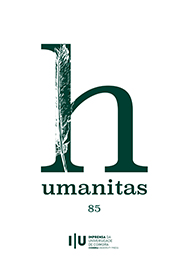Lyric and dramatic forms of the Persian defeat in Aeschylus, Timotheus and Euripides
DOI:
https://doi.org/10.14195/2183-1718_85_2Keywords:
tragedy, nomos, dithyramb, New Music, characterizationAbstract
This paper examines how the defeated oriental barbarian is given voice in Aeschylus’ Persians, Timotheus of Miletus’ nomos Persians, and Euripides’ Orestes. A narratological, literary and linguistic analysis illustrates how literary genre, realistic or mythical setting, and chronology determine the portrait of this type of character in each work. It is shown that, although the formal rules of the different genres are still in force, the influence of the New Music movement brings closest Timotheus and Euripides’ representations of the barbarian.
Downloads
Downloads
Published
Issue
Section
License
Copyright (c) 2025 Humanitas

This work is licensed under a Creative Commons Attribution 4.0 International License.
Authors retain copyright and grant the journal right of first publication with the work simultaneously licensed under a Creative Commons Attribution License that allows sharing the work with recognition of authorship and initial publication in this journal.










